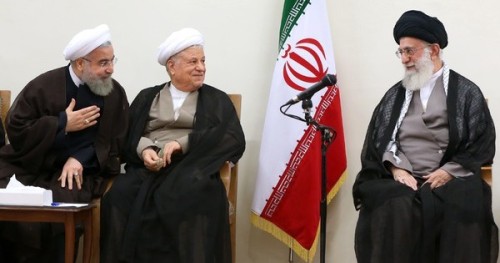PHOTO: Iran’s Supreme Leader (right) speaking to President Rouhani and former President Rafsanjani on Thursday
In a stinging rebuke to the Government — and a possible threat to Iran’s July 14 agreement with the 5+1 Powers — the Supreme Leader has said that Parliament must vote on the deal.
Ayatollah Khamenei issued the statement in a meeting with the Assembly of Experts on Thursday:
Parliament should not be sidelined on the nuclear deal issue….I have told the President that it is not in our interest to not let our lawmakers review the deal.
I have no advice to Majlis regarding review of #JCPOA and approval or disapproval of it, the representatives of nation must decide about it.
— Khamenei.ir (@khamenei_ir) September 3, 2015
President Rouhani and the Government have maintained that Parliament can issue an advisory opinion, but that the Supreme National Supreme Council has the power to endorse the agreement.
Hardline MPs have threatened to block the deal, accusing Rouhani and Foreign Minister Mohammad Javad Zarif of weakness in negotiations with the 5+1 Powers (US, Britain, France, Germany, and Russia).
The Supreme Leader appeared to put up another challenge to the Government with sharp comments about the removal of sanctions on Iran in return for its limits on uranium enrichment and nuclear facilities:
If the framework of the sanctions is to remain in place, what did we negotiate for? This is completely against the reason why the Islamic Republic of Iran partook in negotiations, since the goal of the talks was the removal of the sanctions.
Khamenei insisted that the US, European Union, and UN sanctions must be fully terminated and not just suspended: “Should the sanctions remain in place, then there would be no deal either. So this issue must be resolved.”
He put out an implicit warning that Iran could quickly revive a large nuclear program if the deal collapsed: “We could continue our work and could increase the number of our centrifuges to 50,000 to 60,000 from the current 19,000 in a short while and continue 20% enrichment, and speed up research and development.”
The Supreme Leader did not appear to reject the current timetable of the agreement, under which sanctions will be lifted when the International Atomic Energy Agency verifies Iranian compliance with the terms of the agreement. That verdict is expected around December 15.
However, the complexity of the sanctions regime means that it may take some time for the practical removal of the restrictions, for example, on oil exports. Khamenei has insisted that all sanctions must end on “Day 1” of implementation.
The Supreme Leader’s insistence on a full termination may confront the provisions for sanctions to “snap back” into place if Iran is found in violation of the deal. Washington has been vague in whether sanctions are “suspended” or “removed” when the IAEA gives the signal of Tehran’s compliance.
Khamenei drove home his points with another verbal assault on the US as the cause of problems in Iran and the Middle East, while signalling Iran’s continued political and military support for the Iraqi Government and the regime of Syrian President Bashar al-Assad:
One of the US policies in the region is to annihilate and fully destroy the forces of resistance and fully dominate Syria and Iraq and they expect that the Islamic Republic enter this framework. Such a thing would never transpire.
One should not be duped by the enemy as a result of its smile or probable short-term assistance in a certain issue. We should always find out what the enemy’s plotting and scheme are.

